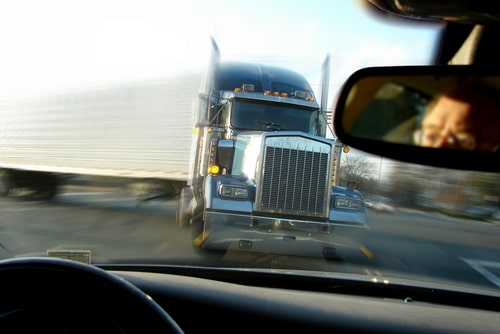Trucking companies have a duty to prioritize safety through proper maintenance, driver training, adherence to federal regulations, and secure cargo practices. When these responsibilities are neglected, they create serious risks for others on the road, leaving the company liable for any resulting harm.
If you or a loved one have been injured in a truck accident, it’s crucial to have a personal injury lawyer experienced in truck accidents advocating for you. At Shapiro, Washburn & Sharp, our car accident law firm has extensive experience handling these complex cases. We are committed to ensuring our clients receive the compensation they deserve. Contact us today at 833-997-1774 for a free consultation to discuss your case and explore your legal options.
What Are a Trucking Company’s Responsibilities Regarding Vehicle Maintenance?
Trucking companies have a legal and ethical duty to ensure their vehicles are well-maintained and safe for operation on public roads. This includes performing regular inspections, maintenance, and repairs as required by the Federal Motor Carrier Safety Administration (FMCSA). Specific responsibilities include:
- Routine inspections: Trucks must undergo pre-trip and post-trip inspections to identify and address any potential safety issues, such as faulty brakes, worn tires, or defective lights.
- Adherence to maintenance schedules: Companies must follow manufacturer-recommended maintenance schedules to keep vehicles in optimal condition.
- Recordkeeping: Trucking companies are required to maintain detailed maintenance and inspection records for each vehicle in their fleet. These records may be used as evidence in the event of an accident investigation.
- Compliance with FMCSA Regulations: Federal law mandates that all commercial vehicles meet strict safety standards to reduce the risk of mechanical failure.
Failure to uphold these responsibilities can lead to dangerous situations, such as brake failures or tire blowouts, and may make the company liable for accidents caused by mechanical defects.
What Responsibilities Do Trucking Companies Have When Hiring and Training Drivers?
Trucking companies are responsible for hiring qualified drivers and providing adequate training to ensure their employees operate vehicles safely. Key obligations include:
- Background checks: Companies must conduct thorough background checks to ensure drivers have valid commercial driver’s licenses (CDLs) and clean driving records. A history of DUIs, reckless driving, or other serious violations may indicate a driver is unfit for employment.
- Drug and alcohol testing: Federal regulations require trucking companies to conduct pre-employment, random, and post-accident drug and alcohol testing. Ensuring drivers are sober is critical for road safety.
- Adequate training: New drivers must receive training on how to operate commercial trucks safely, including understanding weight limits, braking techniques, and defensive driving strategies.
- Monitoring driver performance: Companies are responsible for monitoring their drivers’ performance through ongoing evaluations and ensuring compliance with hours-of-service regulations to prevent fatigue-related accidents.
If a company fails to properly vet or train its drivers and an unqualified or poorly trained driver causes an accident, the company may be held liable for negligence.
How Do Trucking Companies Ensure Compliance with Hours-of-Service Regulations?
Hours-of-service (HOS) regulations are federal rules designed to prevent driver fatigue, a leading cause of truck accidents. Trucking companies are required to enforce these regulations by:
- Limiting driving hours: Drivers are restricted to a maximum of 11 hours of driving following 10 consecutive hours off duty and must not exceed 60 hours in a seven-day period or 70 hours in an eight-day period.
- Monitoring electronic logging devices (ELDs): Federal law mandates the use of ELDs to track driving hours. Companies must ensure drivers use these devices accurately and do not falsify logs.
- Preventing overwork: Companies must avoid pressuring drivers to meet unrealistic delivery schedules that encourage violations of HOS rules.
If a trucking company ignores or encourages violations of HOS regulations and a fatigued driver causes an accident, the company can be held accountable for contributing to the unsafe conditions.
What Role Do Trucking Companies Play in Cargo Loading and Securement?
Trucking companies are responsible for ensuring that cargo is loaded and secured properly to prevent accidents caused by shifting loads, falling debris, or overweight vehicles. These responsibilities include:
- Proper weight distribution: Cargo must be evenly distributed to prevent the truck from becoming unstable or difficult to control.
- Adherence to weight limits: Overloading a truck increases the risk of brake failure and tire blowouts. Companies must ensure trucks comply with federal and state weight limits.
- Securement of cargo: Loose or poorly secured cargo can fall off the truck, creating road hazards for other vehicles. Companies must use appropriate straps, chains, or other securement devices to keep cargo in place.
- Training drivers in cargo safety: Drivers should be trained to inspect and secure cargo before and during trips to ensure continued safety.
If improperly loaded or secured cargo contributes to an accident, the trucking company can be held liable for failing to meet its responsibilities.
What Happens if a Trucking Company Fails to Meet Its Responsibilities?
When a trucking company fails to meet its responsibilities and its negligence leads to an accident, it can be held legally liable for the resulting damages. Victims of trucking accidents may pursue compensation through a personal injury lawsuit against the company. Potential grounds for liability include:
- Negligent hiring or training: Employing unqualified drivers or failing to provide adequate training.
- Negligent maintenance: Allowing unsafe vehicles to operate on the road.
- Encouraging HOS violations: Pressuring drivers to exceed legal driving limits.
- Improper cargo loading: Failing to ensure that cargo is loaded and secured properly.
How Can Your Personal Injury Law Firm Help?
If you or a loved one were injured in a truck accident, do not try to deal with the trucking company and its insurance company on your own. Call Shapiro, Washburn & Sharp at 833-997-1774 to schedule a free consultation and find out how we can help get you the compensation you are entitled to. We handle cases on a contingency-fee basis, so you won’t pay any legal fees unless we win your case.
